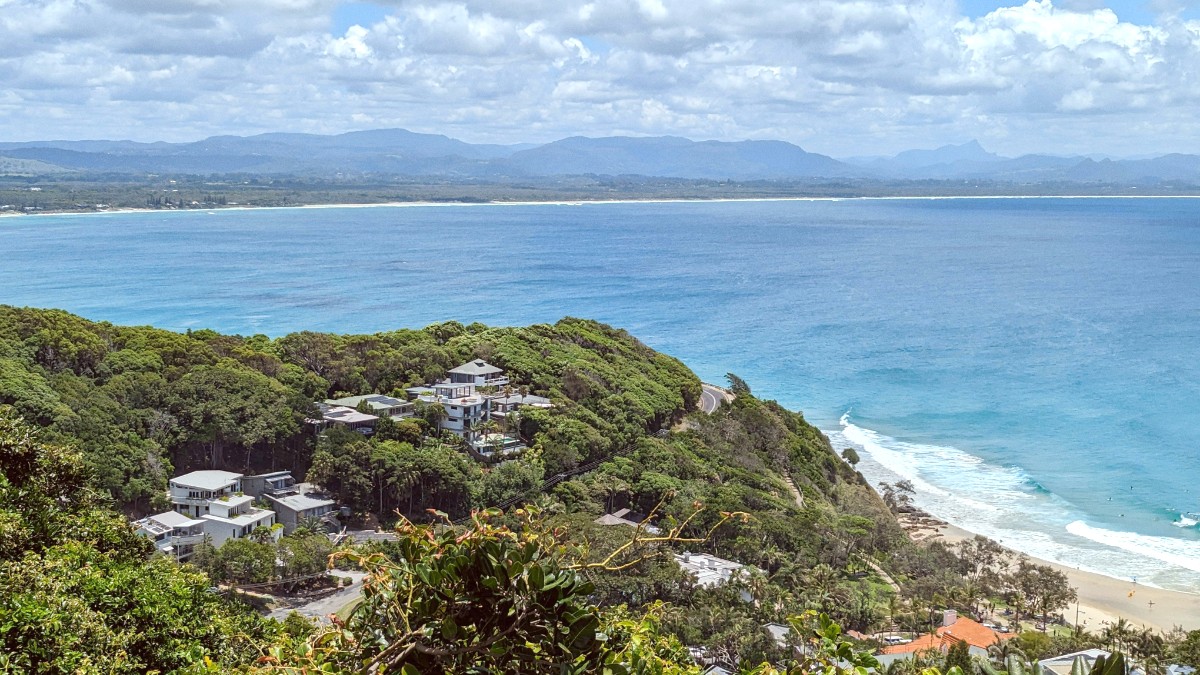
New South Wales, Australia
Byron Bay has a humid subtropical climate, with warm summers and mild winters. Summer (December-February) brings hot, humid conditions, 21°C to 27°C (70°F to 81°F). This season records the highest rainfall, often intense, short tropical downpours. These showers usually pass quickly, leaving fresh air.
Autumn (March-May) offers a pleasant transition. Temperatures are warm, 18°C to 25°C (64°F to 77°F), but humidity drops. The weather during this season tends to be stable, with less rain than summer. It creates a comfortable environment for outdoor activities.
Surf waves are consistent year-round. Autumn (March-May) and spring (September-November) often offer the best conditions with comfortable water temperatures and fewer crowds. Humpback whales migrate along the coast from May to November, with peak viewing in June-July and September-October. December to April offers the warmest water for swimming and extended beach days. Winter (June-August) has cooler, less humid conditions, making it the most comfortable time for longer walks and national park exploration.
Coastal hazards like rip currents are always present on open beaches. Always swim between the red and yellow flags at patrolled beaches. Learn how to spot and escape a rip current before entering the water.
December-February, Holidays
Warmest period, ideal for beach activities, long days.
Very crowded, high prices, queues, high humidity, tropical downpours.
March-May, September-November
Pleasant temperatures, lower humidity, fewer crowds, good value, consistent waves.
Some rainfall possible, ocean temperatures cool slightly late autumn or warm gradually early spring.
June-August (Winter)
Mild temperatures, lowest humidity, significantly fewer crowds, best value, prime whale watching.
Ocean water cooler, evenings require warmer clothing, some outdoor cafes close earlier.
All non-Australian citizens need a visa to enter the country. Common visas include eVisitor (subclass 651) for EU and other European passport holders (free, up to 3 months per visit), Electronic Travel Authority (ETA - subclass 601) for USA, Canada, Japan, etc. (AUD $20, up to 3 months per visit), and Visitor Visa (subclass 600) for others or longer stays (fee, 3, 6, or 12 months). Most applications are online via the Australian Department of Home Affairs website. Apply well in advance, as processing times vary.
Carry your valid passport (6+ months validity), passport-sized photo (for some types), proof of sufficient funds (bank statements), and return or onward travel ticket. Additional documents like invitation letters or itineraries might be relevant. Always check specific requirements for your visa subclass on the Department of Home Affairs website.
No general entry fee beyond visa application fees.
Use automated SmartGates or an immigration officer. Biometric data collection is possible.
Declare all food, plant, and animal products. Failure to declare leads to fines or visa cancellation.
Yellow fever certificate for high-risk zones. General health declaration may apply.
Comprehensive travel insurance is strongly advised for all travelers. World Nomads and SafetyWing are options.
Byron Bay is a sought-after destination, and its popularity reflects in its prices. It is generally more expensive than many other regional towns in Australia.
The official currency is the Australian Dollar (AUD). Coins are 5c, 10c, 20c, 50c, $1, $2. Notes are $5, $10, $20, $50, $100. Credit cards (Visa, Mastercard, American Express) and debit cards are widely accepted. Contactless payment is prevalent. ATMs are available in the town center and at major supermarkets. Currency exchange services exist at banks but are less common than in major cities.
Tipping is not customary or expected in Australia for general services. This applies to restaurants, cafes, bars, and taxis. Wages in Australia are generally fair, and service staff receive a living wage. If you receive truly exceptional service, rounding up the bill or leaving a small amount (e.g., 5-10%) is appreciated but entirely optional and never required.
Hostel dorm beds cost $30-$60/night. Budget hotels are $100-$200/night, mid-range $200-$400/night, and luxury $400-$1000+/night. Budget meals are $15-$25, mid-range $30-$60, fine dining $80+. Coffee is $5-$6, local beer/wine $9-$15. Local bus fare is $3-$6, taxi $10-$25, airport shuttle $25-$35. Car rental is $50-$100/day. Group surfing lessons are $70-$100, whale watching tours $90-$150, dolphin kayaking $70-$90. Crystal Castle entry is $45-$50.
Australia has high safety and hygiene standards, but awareness of local conditions is always wise.
Required if arriving from or transiting through high-risk zones.
Ensure MMR, DTP, polio are up-to-date.
Seek personalized advice well before your trip.
Dial 000 for Police, Fire, or Ambulance in emergencies (free call).
Australia has an excellent healthcare system. Byron Central Hospital (20 Shirley St) provides emergency and general medical services. Several general practitioner clinics operate in town. Multiple pharmacies are in the town center.
Australia has reciprocal healthcare agreements with certain countries (e.g., UK, NZ). Check if your country has one for reduced costs. Other travelers need travel insurance for medical coverage. Medical costs can be very high without it.
Byron Central Hospital: (02) 6685 6200 | NSW Police (non-emergency): 131 444
Tap water in Byron Bay and throughout Australia is safe to drink.
Maintain good hand hygiene, especially before eating.
Food hygiene standards in Australia are very high. Eat at restaurants, cafes, and markets with confidence.
Byron Bay is generally a very safe town with low crime rates. Like any popular tourist destination, petty crime can occur.
Be aware of potential environmental risks depending on the season.
Risk highest during hot, dry periods (late spring to early autumn). Check NSW Rural Fire Service for warnings.
Heavy rainfall from tropical low systems can cause localized flooding. Check Live Traffic NSW for road closures.
Rip currents, large waves, or king tides. Respect closed signs and swim at patrolled beaches.
Comprehensive travel insurance is highly recommended for all international travelers.